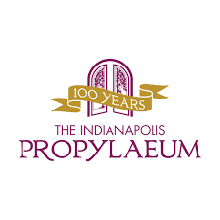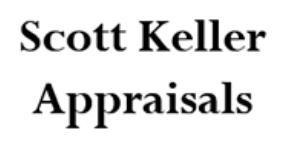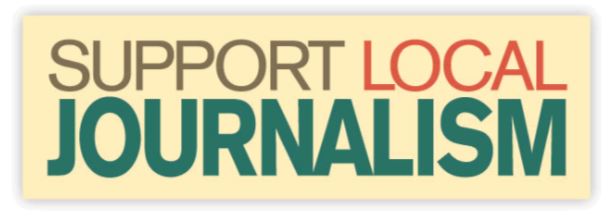A live weekly radio adventure through Indiana history with host Nelson Price.
You can listen to WICR anywhere on your mobile device or at home on your smart speaker. Go to www.wicronline.org to listen live. You can also ask your smart speaker to "play WICR" OR "play 88.7 the Diamond".
January 21, 2023
Eugenics in Indiana-Encore

 During the early 1900s, advocates of eugenics contended that sterilization of people deemed "unfit", often including the mentally ill, "mentally deficient" and some crime in 1907, a national "first" occurred in Indiana, but it wasn't for an achievement that would be regarded with historic pride. Indiana passed the first state eugenics law in the entire country, mandating the sterilization of some men and women in state custody.
During the early 1900s, advocates of eugenics contended that sterilization of people deemed "unfit", often including the mentally ill, "mentally deficient" and some crime in 1907, a national "first" occurred in Indiana, but it wasn't for an achievement that would be regarded with historic pride. Indiana passed the first state eugenics law in the entire country, mandating the sterilization of some men and women in state custody.
Although the 1907 law was found to be unconstitutional during the 1920s, a revised law was eventually passed. It wasn't until the 1970s that all of Indiana's mandatory sterilization laws were repealed.
In this encore of a show originally broadcast in October 2021, Nelson will be joined by his guest, the distinguished Dr. Richard Gunderman, a professor of radiology, pediatrics and medical education at the Indiana University School of Medicine, for insights into the eugenics movement and how it took hold in Indiana. Also in 2021, Dr. Gunderman, who has both MD and Phd degrees, did a virtual presentation about eugenics during the Spirit and Place Festival. That presentation was arranged by the Indiana Medical History Museum.
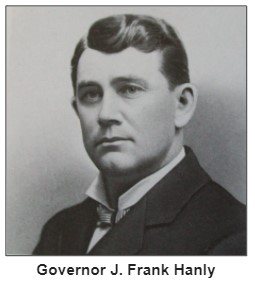 During the early 1900s, advocates of eugenics contended that sterilization of people deemed "unfit", often including the mentally ill, "mentally deficient" and some criminals, could prevent the propagation of traits deemed undesirable. Advocates also contended that some undesirable people were certain to become "bad parents".
During the early 1900s, advocates of eugenics contended that sterilization of people deemed "unfit", often including the mentally ill, "mentally deficient" and some criminals, could prevent the propagation of traits deemed undesirable. Advocates also contended that some undesirable people were certain to become "bad parents".
An Indiana state history marker about the 1907 eugenics law in Indiana was erected 100 years later on the grounds of the Indiana State Library, 140 N. Senate Ave. The marker is within sight of the Indiana Statehouse, where Gov. J. Frank Hanley approved the 1907 eugenics law passed by the state legislature. Casey Pfeiffer, marker manager for the Indiana Historical Bureau, emphasizes that markers are not intended to celebrate their topics, but rather to inform and educate the public about significant events, people and places in history.
According to research by IUPUI, the state law allowed the involuntary sterilization of "confirmed criminals, idiots, imbeciles and rapists". The Indiana Supreme Court ruled the 1907 law was unconstitutional for violating the due process rights of people in mental hospitals, prisons and other state institutions. A revised law was implemented in 1927 that included more safeguards for the rights of patients and prisoners.
 According to the IUPUI research, more than 2,300 of the "state's most vulnerable citizens" were sterilized under the 1927 law until it was repealed. Eugenics laws were eventually passed in 28 states, according to an article in the Indiana Law Journal.
According to the IUPUI research, more than 2,300 of the "state's most vulnerable citizens" were sterilized under the 1927 law until it was repealed. Eugenics laws were eventually passed in 28 states, according to an article in the Indiana Law Journal.
Our guest, Dr. Gunderman, has been researching the eugenics movement. He is the author of 15 books and is a 10-time recipient of the IU Trustees Teaching Award.

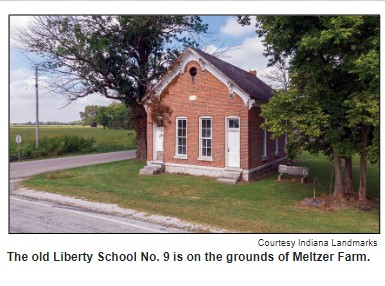
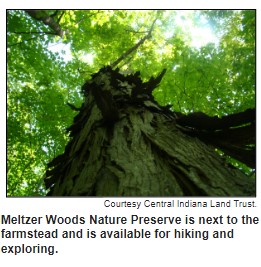 Just south of the farm is an old growth forest and nature preserve called
Just south of the farm is an old growth forest and nature preserve called  Corene Nickel takes the reins as web designer and tech manager; she continues to keep the Hoosier History Live website updated and edits our weekly e-newsletter. She has also accepted the challenge of making our archives more accessible.
Corene Nickel takes the reins as web designer and tech manager; she continues to keep the Hoosier History Live website updated and edits our weekly e-newsletter. She has also accepted the challenge of making our archives more accessible. 